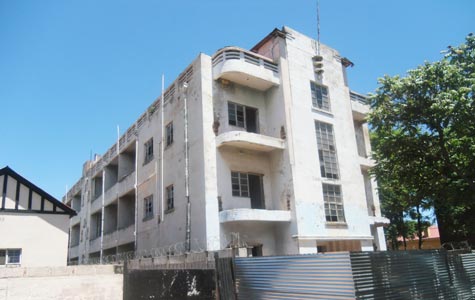
DRIVING towards the Bulawayo Central Business District (CBD), coming from eastern suburbs, one cannot stop marvelling at the breathtaking scenery of the green palm and jacaranda trees that line up the roads.
REPORT BY MUSA DUBE
However, the beautiful and natural outlook just disappears as one gets into the CBD, which is now characterised by old, dilapidated buildings and overcrowded pavements.
Several buildings are derelict and are in a state of disrepair.
The tall and once shiny buildings that used to adorn the country’s second largest city have become an eyesore.
The unkempt state of the CBD has left the Bulawayo City Council (BCC) in a quandary on how best to solve the problem. previous efforts to force property owners to renovate their buildings have proved futile.
Bulawayo was in the 1990s, considered one of the cleanest cities in the world, but regrettably all is now history as it has lost its glamour.
Most of the buildings in the city centre, let alone in the high-density suburbs, urgently require renewal. they no longer meet the standards associated with urban centres.
- Chamisa under fire over US$120K donation
- Mavhunga puts DeMbare into Chibuku quarterfinals
- Pension funds bet on Cabora Bassa oilfields
- Councils defy govt fire tender directive
Keep Reading
Deputy mayor of Bulawayo, Amen Mpofu described this as a serious problem, highlighting that there was need for a massive revamp of buildings in the city centre if Bulawayo was to regain its glamour.
“The council is committed that all those old buildings are spruced up so that they don’t become an eyesore. I think time will come when we will revert to our by-laws so that we end up forcing people to make sure those buildings are presentable,” he said.
It has been reported that about 36 buildings in the city centre were last year considered abandoned, dilapidated or derelict.
Compliance notices were issued as per statutory requirement, as such structures are in contravention of Section 48, the Dangerous Buildings and Section 49, Dilapidated and Unsightly Buildings and Defective Sewerage Systems of the model building By-Laws, 1977, Section 214, of the Bulawayo (buildings, roads and streets) By-Laws 1971.
Although such non-compliance notices were issued to the owners, nothing had changed.
Sometime last year a group of Zanu PF youths reportedly threatened to take over the abandoned buildings, some of them abandoned 15 years ago, but were arrested for invading private property.
City council losing revenue The city council is also reportedly losing thousands of dollars, as it is failing to collect revenue from the abandoned buildings.
“We once talked about those buildings that have not been occupied for a long time and I am sure a solution on the matter is coming up.
“We have to be very careful when approaching this matter. I think dialogue with the property owners is the best way to solve the problem,” the deputy mayor said.
Mpofu, however, sympathised with property owners who were failing to renovate their buildings due to economic hardships. “The issue is a big worry to the city, but we have to look on both sides, taking into account that the economic situation has not improved,” he said.
Bulawayo has been hard-hit by the closure and relocation of industry and this adversely affected the property sector.
Property owners facing financial challenges A manager with a leading property company confirmed that most of their properties were in a deplorable condition and needed to be spruced up.
The official, who requested anonymity, echoed the deputy mayor’s sentiments, that due to low business in Bulawayo, they were failing to maintain their buildings.
“It’s true that our buildings are in terrible condition and our wish is to spruce them up, but it’s unfortunate that we are facing financial constraints to do so. You will appreciate that we are coming from an unstable economic environment,” the manager said.
“The situation that we are in is still very difficult. The occupancy rate in most of our properties is below 50%. “those who are renting them are struggling to pay rentals and this is inhibiting us from maintaining our properties.”
The manager revealed that when the economy stabilised, they were going to make sure that their properties have a facelift.
A survey carried out by The Standard revealed that some shops were violating public health by-laws and the building legislation by operating in dilapidated buildings that do not meet required health standards.
Sheillah Dube, who rents an office for her sewing business at Derby House along Main Street, described the building as pathetic.
“I am just a tenant here and we have tried to engage the owner of the building to refurbish it, but he keeps on promising to do so. the building is dirty and the floor tiles need replacement. If you go to the toilets, it’s terrible. this is not good for our business,” she said.
The failure by the city fathers to timeously collect garbage, that ends up piling in alley ways, has worsened the situation.
Although residents are hopeful that the City of Kings will regain its status, there are fears that if the economy does not stabilise anytime soon, it risks becoming another ghost town.











